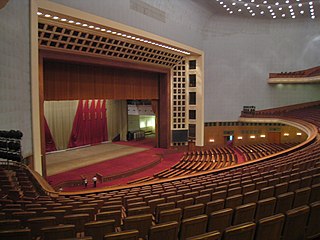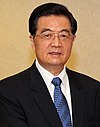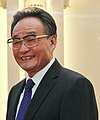
Wen Jiabao is a Chinese retired politician who served as the premier of China from 2003 to 2013. In his capacity as head of government, Wen was regarded as the leading figure behind China's economic policy. From 2002 to 2012, he held membership in the Politburo Standing Committee of the Chinese Communist Party, the country's de facto top power organ, where he was ranked third out of nine members and after general secretary Hu Jintao and Wu Bangguo, chairman of the Standing Committee of the National People's Congress.

Bo Xilai is a Chinese former politician who was convicted on bribery and embezzlement charges. He came to prominence through his tenures as Mayor of Dalian and then the governor of Liaoning. From 2004 to November 2007, he served as Minister of Commerce. Between 2007 and 2012, he served as a member of the Politburo of the Chinese Communist Party (CCP) and Communist Party Secretary of Chongqing, a major interior municipality. He was generally considered the main political rival of Xi Jinping before Xi became the paramount leader of China.

Li Keqiang was a Chinese economist and politician who served as the premier of China from 2013 to 2023. He was also the second-ranked member of the Politburo Standing Committee of the Chinese Communist Party (CCP) from 2012 to 2022. Li was a major part of the "fifth generation of Chinese leadership" along with Xi Jinping, the CCP general secretary.
The 5th Session of the 10th National People's Congress held its annual meeting from March 5 to March 15, 2007 at the Great Hall of the People in Beijing, China, in conjunction with the 2007 CPPCC. Many items were listed on the agenda for the two-week-long session of the National People's Congress. 2,937 delegates from every province and municipality attended, along with representatives from the People's Liberation Army. Among the delegations were those from the Special Administrative Regions of Hong Kong and Macau and a delegation representing Taiwan. Details on the election of these delegations can be found on the main article on the National People's Congress. The 2007 Session was chaired by Standing Committee Chairman Wu Bangguo, with the annual Government Report delivered by Premier Wen Jiabao. The 2007 Session also set the precedent of allowing foreign journalists to approach and interview any NPC members without restriction. All proposals and resolutions from the session for the first time were fully translated into English. The 2007 NPC formally approved the Property Law of the People's Republic of China which had been under discussion for the last several years. Shanghai party chief Chen Liangyu has been suspended and therefore did not participate in the NPC. However, Vice-Premier Huang Ju, who had been widely speculated in the Hong Kong media and Western sources to have fallen into political disgrace, though reported in the Chinese press as having been in bad health, made an appearance at the opening ceremonies on March 5. Huang genuinely appeared ill.

The 17th National Congress of the Chinese Communist Party was held in Beijing, China, at the Great Hall of the People from 15 to 21 October 2007. Congress marked a significant shift in the political direction of the country as CCP General Secretary Hu Jintao solidified his position of leadership. Hu's signature policy doctrine, the Scientific Development Concept, which aimed to create a "Socialist Harmonious Society" through egalitarian wealth distribution and concern for the country's less well-off, was enshrined into the Party Constitution. It was succeeded by the 18th National Congress of the Chinese Communist Party.

Zhang Dejiang is a Chinese retired politician who served as the chairman of the Standing Committee of the National People's Congress between 2013 and 2018. He was also the third-ranking member of the Politburo Standing Committee of the Chinese Communist Party from 2012 to 2017.

Wang Yang is a Chinese retired politician who served as the chairman of the National Committee of the Chinese People's Political Consultative Conference from 2018 to 2023. He was also the fourth-ranking member of the Politburo Standing Committee of the Chinese Communist Party from 2017 to 2022.

The 11th National People's Congress (NPC) met for a 5-year term, from 2008 to 2013. It held five annual two week plenary sessions during this period. It succeeded the 10th National People's Congress. There were 2,987 deputies elected to the 11th Congress in 2008,
The 1st Session of the 11th National People's Congress held its annual meeting from March 5 to March 18, 2008 in the Great Hall of the People in Beijing, China, in conjunction with the 2008 CPPCC.

Sun Zhengcai is a former Chinese politician and senior regional official. From 2012 to 2017, Sun served as the Communist Party Secretary of Chongqing, an interior municipality, and a member of the Politburo of the Chinese Communist Party. Prior to that, he served as the Party Secretary of Jilin province, and Minister of Agriculture of China.
The 2nd Session of the 11th National People's Congress was the annual meeting of the highest legislative body of the People's Republic of China, which was held in March 2009 at the Great Hall of the People in Beijing. The event began on March 5 and lasted until March 13. The Congress was followed closely because of the possible impact any policy changes would have on the Chinese and world economy. Major issues discussed at the Congress include the 2007–2008 financial crisis, economy of China, curbing unemployment, and social welfare.

The Chongqing gang trials were a series of triad-busting trials in the city of Chongqing that began in October 2009 and concluded in 2011. Carried out under the auspices of municipal Communist Party chief Bo Xilai and police chief Wang Lijun, a total of 4,781 suspects were arrested, including 19 suspected crime bosses, hundreds of triad members, and a number of allegedly corrupt police, government and Communist party officials, including six district police chiefs and the city's former deputy police commissioner, Wen Qiang. Time described it as "China's trial of the 21st century". The crackdown is believed to be the largest of its kind in the history of the People's Republic of China. Concerns over due process surfaced following the trial, including allegations of torture, forced confessions, and intimidation.
The 3rd Session of the 11th National People's Congress held its annual meeting in March 2010 at the Great Hall of the People in Beijing, China. The event opened on March 5, 2010 and concluded on March 14, 2010.
The 4th Session of the 11th National People's Congress held its annual meeting in March 2011 at the Great Hall of the People in Beijing, China. The event opened on 5 March and concluded on 14 March. The meeting was expected to approve the country's 12th Five Year Plan.

The Wang Lijun incident was a major Chinese political scandal which began in February 2012 when Wang Lijun, vice-mayor of Chongqing, was abruptly demoted, after revealing to the United States consulate details of British businessman Neil Heywood's murder and subsequent cover-up. Amidst rumors of political infighting with Chongqing Communist Party secretary Bo Xilai, Wang arranged a meeting on 6 February at the US consulate in Chengdu, where he remained for over 30 hours. Observers speculated that Wang may have been attempting to defect or to seek refuge from Bo. He then left the consulate of his own volition and was taken to Beijing by agents and the vice minister Qiu Jin (邱进) of the Ministry of State Security. The Chongqing municipal government declared that Wang was receiving "vacation-style medical treatment".
Cake theory is a metaphor about economic development and the redistribution of wealth in the political discourse of China. It emerged in 2010 as problems with an increased wealth gap became gradually more apparent. If economic development is seen as analogous to baking a cake, one side of the debate suggests that development should focus on "dividing the cake more fairly", while the other says development should be focused on "baking a bigger cake".

The "Chongqing model" was a series of social and economic policies adopted in the Chinese megalopolis of Chongqing. It is most closely associated with Bo Xilai, who served as the city's Communist Party secretary from 2007 to 2012, though some policies were put in place by Bo's predecessors.

Xu Ming was a Chinese entrepreneur and billionaire. He was the founder of the conglomerate Dalian Shide Group, and the chairman of Dalian Shide F.C., China's top football club in the 2000s. In 2005, Forbes ranked him the eighth-richest person in China, with an estimated net worth of US$1.05 billion, but his net worth declined to $690 million in 2011. The 2013 Hurun Report estimated his wealth to be around US$490 million, ranking 676th in China.

The Li Keqiang Government was the Central People's Government of China from 15 March 2013, when Premier Li Keqiang took office, until March 2023. It succeeded the Wen Jiabao government. Premier Li was ranked only second to Party general secretary Xi Jinping among 7 members of the 18th and 19th Politburo Standing Committee, top decision-making body of the Chinese Communist Party (CCP).

The Press Conference of the Premier of the State Council, also known as the "Premier's Q&A with Journalists", is a meeting held by the Premier of the State Council, who serves as the head of government of China, with both domestic and foreign journalists. The Premier's press conference started in 1988 when Premier Li Peng accepted an invitation from the spokesperson of the 7th National People's Congress, Zeng Tao, to meet with journalists from mainland China, Hong Kong, Macau, Taiwan, and foreign countries.

















